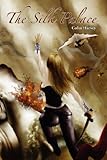 Sound + Noise by Curtis Smith
Sound + Noise by Curtis SmithMy review
rating: 3 of 5 stars
Curtis Smith’s "Sound and Noise" is a fascinating portrayal of two people trapped in lives of stagnant frustration. When she was younger, and felt she had everything ahead of her, Jackie used to sing backing vocals in a big rock band. Now she’s middle-aged, single, and running her own bar, with only a crazy selection of locals to hear her new songs – a far cry from where she saw herself headed all those years ago. Tom is an art teacher at the local university, a married man, but one whose wife lives in a residential home, knowing little to nothing of the world around her. Her tragic accident has left Tom unable to move forward with his life, and forced him to examine his relationship with religion.
Jackie and Tom meet in a supermarket and strike up a friendship – one Jackie thinks will turn into just another affair, until she finds out the truth about his wife. Throughout their relationship, they both begin to work out their problems and look at what the future may hold.
"Sound + Noise" is a will-they-won’t-they romance, with an undercurrent of philosophical introspection on the part of both major characters running throughout. This angle gives it one up on the average romance, and Curtis Smith hits on the doubts and regrets many people have in common, but can’t always share. Because of this, the story is very accessible.
The characters are drawn from backgrounds that aren’t privileged and much of the interest lies in what they choose to do with the natural talents they have. Despite their struggles, their story doesn’t come across as whiney and they don’t suffer from self-pity for too long.
The usual limitations of romance novels are predictable plots and unbelievable characters. The characterisation in "Sound + Noise" is realistic for the most part, with some occasional dreamy, but not sickly-sweet, observations. The plot is predictable and the ending exactly as expected, but this doesn’t diminish the quality of the story, as the anticipated ending is a satisfactory one. Smith's prose is full of quirky, occasionally beautiful, passages that I found absorbing and evocative – a good example is the pair’s first meeting:
"Jackie holds up an avocado between them, and sees another picture—the same one she used to stare at when Sunday school got boring: the unsuspecting Adam and the naked, foolish Eve, her apple replaced by that mysterious and suddenly erotic fruit, the avocado." (p.12)
This strange and awkward moment is turned into a grand event for Jackie, who has been single for far too long.
At times, I felt that Smith was grasping for something just out of reach. Tom and Jackie’s relationship could have been as touching, and even as harrowing, as the relationships portrayed in Ian McEwan’s work, which I find stylistically comparable. But although the characters have depth, Smith doesn’t push them as far as he could to let the reader see what they are really made of. It would be nice also to see more made of the supporting characters, as they are a bit too shallow for my taste.
Overall, though, "Sound + Noise" is thought-provoking and well written.
View all my reviews.















